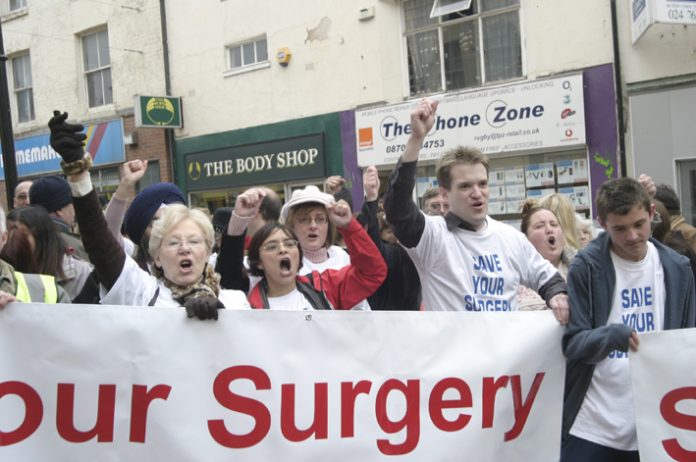The British Medical Association (BMA) yesterday slammed pressures being put on GPs by private companies running out of hours services to cut down on hospital referrals and visits to patients to maximise profits.
Dr Laurence Buckman, chairman of the BMA’s GPs Committee told News Line: ‘We deprecate any attempt to persuade doctors who work for Out-of-Hours providers to alter their clinical behaviour for any reason except to move it to a higher standard for the benefit of patients.
‘To make clinical care less good for the employers’ own financial reasons is very disturbing and GPs should refuse to work in this way.’
He was responding to revelations in the Pulse magazine, which said it had learned that ‘a series of providers across the country’ have introduced ‘performance management targets on criteria such as the percentage of house visits, length of telephone calls, referrals to 999 and hospital admissions’.
Dr Lesli Davies who led a mass protest in Rugby to ‘save our surgeries’ from privately run polyclinics, told News Line: ‘It’s our worst fear realised.
‘It’s being driven by the dollar not patients needs.
‘It’s absolute nonsense, money can’t decide whether a patient needs referral to hospital or a visit from the doctor.’
Urgent Care 24 in Liverpool, Harmoni in central and southern England and Seldoc in south London all admitted introducing performance management criteria.
In Kent, the out-of-hours provider On Call Care has cut doctor hours by 5% after a Primary Care Trust (PCT) funding cutback, and brought in a performance management system aimed at making the service more ‘cost effective’.
In a leaked email to GPs, Dr Mark Reynolds, chief executive and medical director of On Call Care warns GPs they risk being taking off the out-of-hours rota unless they meet requirements.
Dr Ashish Dwivedi, chief executive of Seldoc, told Pulse that performance management of GPs was essential, given ‘doctors are the most expensive human resource in the NHS’.
Dr Chaand Nagpaul, BMA GPC negotiator with responsibility for out-of-hours care, said there was pressure on companies to ‘make efficiencies’ because PCTs were struggling to manage the cost of running out-of-hours services.
GMB trade union national officer for public services Sharon Holder told News Line: ‘The GMB has never supported private companies in the NHS.
‘This is another case of shareholders having precedence over the social needs of the UK public.
‘What concerns us is the fact that the private companies are now dictating the level of services that NHS patients get.
‘It also very much concerns us that they are putting profit before the needs of patients.’
The BMA’s Dr Buckman also commented on the NHS Confederation’s report on polyclinics published yesterday.
He said: ‘We are against the headlong rush into polyclinics or health centres that is a current feature of primary care trust activity all over the country.
‘Whether called polyclinics as in London, or “health centres”, these developments have the potential to undermine long-established routes for delivering quality patient care.
‘Communications from central government to Strategic Health Authorities make it clear that the contracts for these polyclinics/health centres are likely to be APMS contracts (Alternative Providers of Medical Services) which is the route under which private commercial companies would provide general practice care.
‘This commercialisation of patient care in the community is the very opposite of the personalised care which the government espouses and which family doctors already provide.
‘Rather than being forced to create new services in this way, PCTs should be encouraged to invest in their local GP practices and support joint working between practices.’
